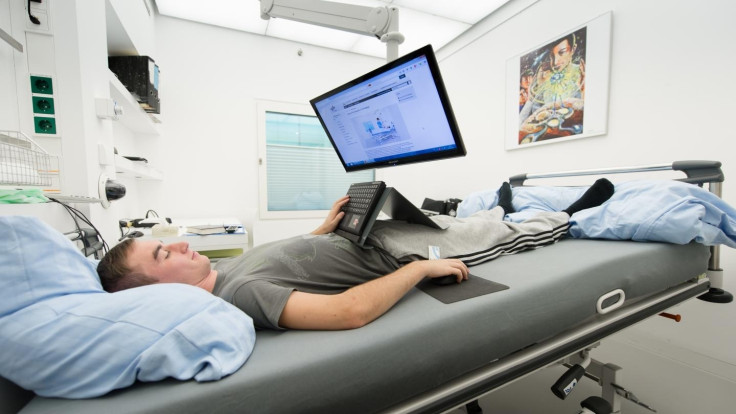Nasa wants 12 volunteers to lie in bed for a whole month
But the beds will be tilted down.

Twelve volunteers are taking part in an experiment at the German Space Agency's Institute (DLR) of Aerospace Medicine, for which they are required to lie in bed for a whole month in the name of science.
However, this won't be as easy as it sounds. The beds will be tilted head-down by six degrees and the participants must remain in the same position for duration of the study, even when eating, showering and going to the toilet. This causes their bodies to adapt as if they were in space.
Nasa is funding the study in order to learn more about the effects of fluid pressure on the eyes and optic nerves of astronauts in space. The tilt of the bed will simulate the weightless nature of space, where the fluids in your body shift toward your head, causing vision problems in some astronauts.
To mimic conditions in a spacecraft, the air they breathe will contain 0.5% carbon dioxide. By comparison, the normal air we breathe is made up of only about 0.04% CO2. On many spacecraft, carbon dioxide levels are higher than on Earth, due in part to the enclosed nature of the environment.
Bed rest studies such as these provide researchers with an opportunity to observe how the body adapts to weightlessness. The participants are being continuously monitored in order to understand how and why their bodies change.
Several MRIs will observe potential changes in either brain or eye structure. Meanwhile, blood pressure, heart rate, nutrient absorption, energy expenditure, bone mass and even the participants' moods are being examined. Their diet is also strictly controlled.
The researchers hope the data collected can be used to devise countermeasures for combating the negative effects of weightlessness in space. However, it could also help bed-ridden people on Earth.
Boredom may be the biggest challenge for the participants so they have been encouraged to set a goal, such as learning a new language or taking an online class. Visitors are not allowed, although they do get to keep their phones so they can stay in touch with friends and family.
The study, known as VaPER, is part of Nasa's Flight Analogs Program, a series of studies that simulate the physical, mental or emotional effects of being in space. In the long run, these experiments will provide scientists with important insights as humans venture deeper into space.





















